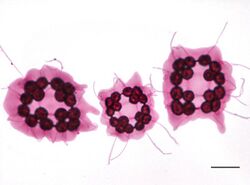Biology:Platydorina
| Platydorina | |
|---|---|

| |
| Stained coenobia | |
| Scientific classification | |
| (unranked): | Viridiplantae |
| Division: | Chlorophyta |
| Class: | Chlorophyceae |
| Order: | Chlamydomonadales |
| Family: | Volvocaceae |
| Genus: | Platydorina Kofoid |
| Species: | P. caudata
|
| Binomial name | |
| Platydorina caudata Kofoid
| |
Platydorina is a genus of microscopic green algae in the family Volvocaceae.[1] It contains only one species, Platydorina caudata.[2] It was described by Charles Atwood Kofoid in 1899.[3]
Description
Platydorina caudata consists of a flattened, horseshoe-shaped coenobium containing 16 or 32 cells embedded in a transparent, gelatinous matrix. Cells have two flagella that protrude out of the matrix. Each cell is uniformly sized and colored green from a single cup-shaped chloroplast containing a pyrenoid, with a circular red eyespot and two contractile vacuoles. At one end the matrix is rounded, while at the other end it is drawn out into a few rounded "tails".[3]
Platydorina caudata is planktonic, and moves in a spiral motion, twisting to the left.[3]
Reproduction
Platydorina caudata reproduces both sexually and asexually. In asexual reproduction, cells in the coenobium divide continuously until they reach a certain cell count, 16 or 32 cells. At this point, the flagella are pointing inward, but the colony flips inside out (a process known as colony inversion) such that the flagella now point outward. The colony, which is spherical, flattens out into the characteristic horseshoe-shape. After the gelatinous matrix forms, the new colony separates from the parent.[4]
In sexual reproduction, colonies may be either male or female and produce sperm or egg cells, respectively. It is anisogamous, meaning the gametes are differently sized. Both sperm and egg cells are released, where they swim about until fertilized. Egg cells escape in an unusual way; a pore forms, and then the egg cell squeezes through the pore until it is released.[4]
References
- ↑ See the NCBI webpage on Platydorina. Data extracted from the "NCBI taxonomy resources". National Center for Biotechnology Information. http://ftp.ncbi.nih.gov/pub/taxonomy/. Retrieved 2007-03-19.
- ↑ Guiry, M.D.; Guiry, G.M. (2008). "Platydorina". AlgaeBase. World-wide electronic publication, National University of Ireland, Galway. http://www.algaebase.org/browse/taxonomy/?id=44578.
- ↑ 3.0 3.1 3.2 Kofoid, C.A. (1899). "Plankton studies. III. On Platydorina, a new genus of the family Volvocidae, from the plankton of the Illinois River". Bulletin of the Illinois State Laboratory of Natural History 5 (9): 419–440, pi. 38. doi:10.21900/j.inhs.v5.420.
- ↑ 4.0 4.1 Taft, Clarence E. (1940). "Asexual and Sexual Reproduction in Platydorina caudata Kofoid". Transactions of the American Microscopical Society 59 (1): 1–11. doi:10.2307/3222811.
Wikidata ☰ Q1237200 entry
 |

